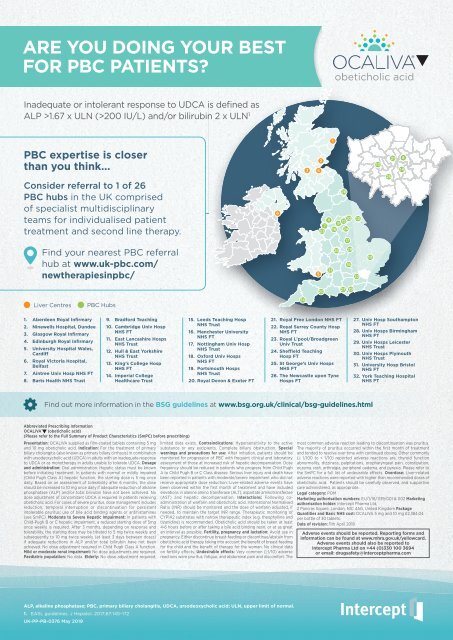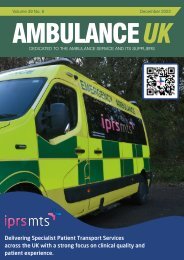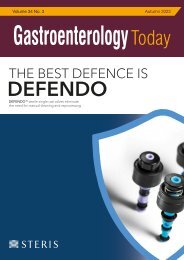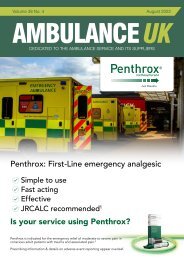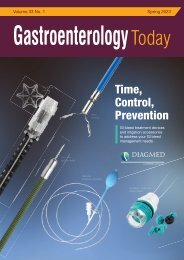Create successful ePaper yourself
Turn your PDF publications into a flip-book with our unique Google optimized e-Paper software.
NEWS<br />
ARE YOU DOING YOUR BEST<br />
FOR PBC PATIENTS?<br />
Inadequate or intolerant response to UDCA is defined as<br />
ALP >1.67 x ULN (>200 IU/L) and/or bilirubin 2 x ULN 1<br />
1<br />
PBC expertise is closer<br />
than you think...<br />
Consider referral to 1 of 26<br />
PBC hubs in the UK comprised<br />
of specialist multidisciplinary<br />
teams for individualised patient<br />
treatment and second line therapy.<br />
6<br />
3 4<br />
2<br />
26<br />
11<br />
32<br />
15<br />
9<br />
7<br />
24<br />
23<br />
16<br />
17<br />
12<br />
13<br />
25<br />
21 8<br />
14<br />
Find your nearest PBC referral<br />
hub at www.uk-pbc.com/<br />
newtherapiesinpbc/<br />
5<br />
31<br />
28<br />
29<br />
18<br />
22<br />
10<br />
20<br />
27 19<br />
Liver Centres<br />
PBC Hubs<br />
30<br />
1. Aberdeen Royal Infirmary<br />
2. Ninewells Hospital, Dundee<br />
3. Glasgow Royal Infirmary<br />
4. Edinburgh Royal Infirmary<br />
5. University Hospital Wales,<br />
Cardiff<br />
6. Royal Victoria Hospital,<br />
Belfast<br />
7. Aintree Univ Hosp NHS FT<br />
8. Barts Health NHS Trust<br />
9. Bradford Teaching<br />
10. Cambridge Univ Hosp<br />
NHS FT<br />
11. East Lancashire Hosps<br />
NHS Trust<br />
12. Hull & East Yorkshire<br />
NHS Trust<br />
13. King’s College Hosp<br />
NHS FT<br />
14. Imperial College<br />
Healthcare Trust<br />
15. Leeds Teaching Hosp<br />
NHS Trust<br />
16. Manchester University<br />
NHS FT<br />
17. Nottingham Univ Hosp<br />
NHS Trust<br />
18. Oxford Univ Hosps<br />
NHS FT<br />
19. Portsmouth Hosps<br />
NHS Trust<br />
20. Royal Devon & Exeter FT<br />
21. Royal Free London NHS FT<br />
22. Royal Surrey County Hosp<br />
NHS FT<br />
23. Royal L’pool/Broadgreen<br />
Univ Trust<br />
24. Sheffield Teaching<br />
Hosp FT<br />
25. St George’s Univ Hosps<br />
NHS FT<br />
26. The Newcastle upon Tyne<br />
Hosps FT<br />
27. Univ Hosp Southampton<br />
NHS FT<br />
28. Univ Hosps Birmingham<br />
NHS FT<br />
29. Univ Hosps Leicester<br />
NHS Trust<br />
30. Univ Hosps Plymouth<br />
NHS Trust<br />
31. University Hosp Bristol<br />
NHS FT<br />
32. York Teaching Hospital<br />
NHS FT<br />
Find out more information in the BSG guidelines at www.bsg.org.uk/clinical/bsg-guidelines.html<br />
GASTROENTEROLOGY TODAY - SUMMER <strong>2019</strong><br />
Abbreviated Prescribing Information<br />
OCALIVA ® (obeticholic acid)<br />
(Please refer to the Full Summary of Product Characteristics (SmPC) before prescribing)<br />
Presentation: OCALIVA supplied as film-coated tablets containing 5 mg<br />
and 10 mg obeticholic acid. Indication: For the treatment of primary<br />
biliary cholangitis (also known as primary biliary cirrhosis) in combination<br />
with ursodeoxycholic acid (UDCA) in adults with an inadequate response<br />
to UDCA or as monotherapy in adults unable to tolerate UDCA. Dosage<br />
and administration: Oral administration. Hepatic status must be known<br />
before initiating treatment. In patients with normal or mildly impaired<br />
(Child Pugh Class A) hepatic function, the starting dose is 5 mg once<br />
daily. Based on an assessment of tolerability after 6 months, the dose<br />
should be increased to 10 mg once daily if adequate reduction of alkaline<br />
phosphatase (ALP) and/or total bilirubin have not been achieved. No<br />
dose adjustment of concomitant UDCA is required in patients receiving<br />
obeticholic acid. For cases of severe pruritus, dose management includes<br />
reduction, temporal interruption or discontinuation for persistent<br />
intolerable pruritus; use of bile acid binding agents or antihistamines<br />
(see SmPC). Moderate to Severe Hepatic Impairment: In patients with<br />
Child-Pugh B or C hepatic impairment, a reduced starting dose of 5mg<br />
once weekly is required. After 3 months, depending on response and<br />
tolerability, the starting dose may be titrated to 5 mg twice weekly and<br />
subsequently to 10 mg twice weekly (at least 3 days between doses)<br />
if adequate reductions in ALP and/or total bilirubin have not been<br />
achieved. No dose adjustment required in Child Pugh Class A function.<br />
Mild or moderate renal impairment: No dose adjustments are required.<br />
Paediatric population: No data. Elderly: No dose adjustment required;<br />
limited data exists. Contraindications: Hypersensitivity to the active<br />
substance or any excipients. Complete biliary obstruction. Special<br />
warnings and precautions for use: After initiation, patients should be<br />
monitored for progression of PBC with frequent clinical and laboratory<br />
assessment of those at increased risk of hepatic decompensation. Dose<br />
frequency should be reduced in patients who progress from Child Pugh<br />
A to Child Pugh B or C Class disease. Serious liver injury and death have<br />
been reported in patients with moderate/severe impairment who did not<br />
receive appropriate dose reduction. Liver-related adverse events have<br />
been observed within the first month of treatment and have included<br />
elevations in alanine amino transferase (ALT), aspartate aminotransferase<br />
(AST) and hepatic decompensation. Interactions: Following coadministration<br />
of warfarin and obeticholic acid, International Normalised<br />
Ratio (INR) should be monitored and the dose of warfarin adjusted, if<br />
needed, to maintain the target INR range. Therapeutic monitoring of<br />
CYP1A2 substrates with narrow therapeutic index (e.g. theophylline and<br />
tizanidine) is recommended. Obeticholic acid should be taken at least<br />
4-6 hours before or after taking a bile acid binding resin, or at as great<br />
an interval as possible. Fertility, pregnancy and lactation: Avoid use in<br />
pregnancy. Either discontinue breast-feeding or discontinue/abstain from<br />
obeticholic acid therapy taking into account the benefit of breast-feeding<br />
for the child and the benefit of therapy for the woman. No clinical data<br />
on fertility effects. Undesirable effects: Very common (≥1/10) adverse<br />
reactions were pruritus, fatigue, and abdominal pain and discomfort. The<br />
most common adverse reaction leading to discontinuation was pruritus.<br />
The majority of pruritus occurred within the first month of treatment<br />
and tended to resolve over time with continued dosing. Other commonly<br />
(≥ 1/100 to < 1/10) reported adverse reactions are, thyroid function<br />
abnormality, dizziness, palpitations, oropharyngeal pain, constipation,<br />
eczema, rash, arthralgia, peripheral oedema, and pyrexia. Please refer to<br />
the SmPC for a full list of undesirable effects. Overdose: Liver-related<br />
adverse reactions were reported with higher than recommended doses of<br />
obeticholic acid. Patients should be carefully observed, and supportive<br />
care administered, as appropriate.<br />
Legal category: POM<br />
Marketing authorisation numbers: EU/1/16/1139/001 & 002 Marketing<br />
authorisation holder: Intercept Pharma Ltd,<br />
2 Pancras Square, London, N1C 4AG, United Kingdom Package<br />
Quantities and Basic NHS cost: OCALIVA 5 mg and 10 mg £2,384.04<br />
per bottle of 30 tablets.<br />
Date of revision: 11th April 2018<br />
Adverse events should be reported. Reporting forms and<br />
information can be found at www.mhra.gov.uk/yellowcard.<br />
Adverse events should also be reported to<br />
Intercept Pharma Ltd on +44 (0)330 100 3694<br />
or email: drugsafety@interceptpharma.com<br />
18<br />
ALP, alkaline phosphatase; PBC, primary biliary cholangitis, UDCA, ursodeoxycholic acid; ULN, upper limit of normal.<br />
1. EASL guidelines. J Hepatol. 2017;67:145–172<br />
UK-PP-PB-0376 May <strong>2019</strong>


